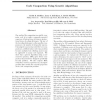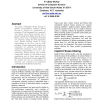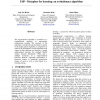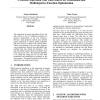118
click to vote
GECCO
2000
Springer
15 years 5 months ago
2000
Springer
One method for compacting executable computer code is to replace commonly repeated sequences of instructions with macro instructions from a decoding dictionary. The size of the de...
GECCO
2000
Springer
15 years 5 months ago
2000
Springer
105
click to vote
GECCO
2000
Springer
15 years 5 months ago
2000
Springer
This paper investigates fitness sharing in genetic programming. Implicit fitness sharing is applied to populations of programs. Three treatments are compared: raw fitness, pure fi...
102
click to vote
GECCO
2000
Springer
15 years 5 months ago
2000
Springer
The organizational algorithm is examined as a computational approach to representing interpersonal learning. The structure of the algorithm is introduced and described in context ...
114
click to vote
GECCO
2000
Springer
15 years 5 months ago
2000
Springer
This paper gives a theoretical and empirical analysis of the time complexity of genetic algorithms (GAs) on problems with exponentially scaled building blocks. It is important to ...
147
click to vote
GECCO
2000
Springer
15 years 5 months ago
2000
Springer
This paper presents a genetic algorithm based method to solve the capacity and routing assignment problem arising in the design of selfhealing networks using the Virtual Path (VP)...
105
click to vote
GECCO
2000
Springer
15 years 5 months ago
2000
Springer
The integration of genetic algorithms (GAs) and tabu search is one of traditional problems in function optimization in the GA literature. However, most proposed methods have utili...
112
click to vote
GECCO
2000
Springer
15 years 5 months ago
2000
Springer
A mathematical formula containing one or more free variables is "general" in the sense that it represents the solution to all instances of a problem (instead of just the...
106
Voted
GECCO
2000
Springer
15 years 5 months ago
2000
Springer
A general variable length genome, called exG, is developed here to address the problems of fixed length representations in canonical evolutionary algorithms. Convergence aspects o...
121
Voted
GECCO
2000
Springer
15 years 5 months ago
2000
Springer
This paper presents an extension to genetic programming to allow the evolution of programs containing local variables with static scope which obey the invariant that all variables...




